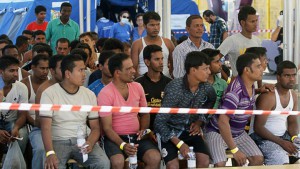At least 224,000 migrants have crossed the Mediterranean to Europe so far this year, the United Nations said Thursday, a day after more than 200 people were feared drowned trying to make the perilous journey.
“What we have at Europe’s doorstep is a refugee crisis,” UN refugee agency spokesman William Spindler told AFP in an email.
He said that by the end of July, around 224,000 migrants had arrived in Europe by sea.
That number is already higher than the total of 219,000 people who made the journey during all of 2014, which until now was the highest number on record.
Nearly all of the people crossing the Mediterranean during the first seven months of the year, often in rickety boats and at the mercy of human traffickers, have landed in Greece (124,000) and in Italy (98,000), he said.
During that period, far from everyone has made it to shore, with more than 2,100 people drowning or going missing, Spindler said.
He said this figure did not take into account the estimated 200 people believed to have perished in a shipwreck off the coast of Libya on Wednesday.
Their fishing boat, believed to have been carrying more than 600 people, ran into difficulty about 15 nautical miles off Libya and tipped over when rescuers neared, after frantic migrants rushed to one side in their desperation to be saved.
Irish patrol vessel Niamh, first on the scene of the disaster, arrived in Palermo Thursday with 367 survivors, including 12 women and 13 children, as well as 25 bodies recovered from the sea.
Two similar incidents in April cost the lives of around 1,200 people.
Many of those risking their lives to cross the Mediterranean travel on to other European countries, with a number of them setting their sights on Britain, which along with France is grappling with a migrant crisis of its own.
‘European failure to respond’
The waves of arriving migrants has sparked outcry and growing anti-foreigner rhetoric in many countries, but Spindler said most of those arriving on the continent this year had little choice.
“Most of those crossing the Mediterranean are economic migrants,” Spindler said, Eritreans make up 12 percent of those landing on Europe’s shores, followed by Afghans at 11 percent, Nigerians at five percent and Somalis at four percent, he said.
Spindler criticised European countries for not better coordinating their response.
“The reason this is a crisis is not because of the number of refugees, but because of Europe’s failure to respond to it in a coordinated fashion,” he said.
“European countries need to work together rather than point fingers at each other.”



